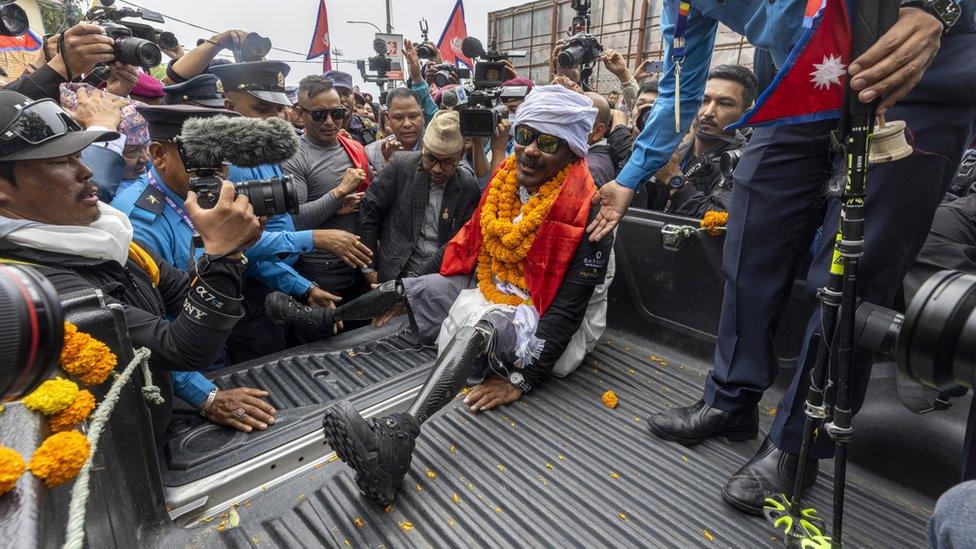Mount Everest: Double amputee climbs tallest mountain in the world
- Published
- comments

Hari wants to change the percecption of disability in Nepal
A 43-year-old man has made history, by becoming the first ever double-above-the-knee amputee to climb Mount Everest - the tallest mountain in the world.
Hari Budha Magar, who lives in Canterbury, Kent, started his climb on 17 April and reached the summit (the top of the mountain) at 3pm on Friday.
He's a Gurkha war veteran, which means he's from Nepal and has been recruited at a soldier by the British army.
Hari lost both his legs whilst serving in Afghanistan.
The climber said he wanted to "inspire others" and change people's opinion of disability.
Hari got a warm welcome when he went to Kathmandu after his climb
However, climbing Everest has given a new perspective - he said: "Without [losing my legs], I wouldn't be climbing Everest, so it wouldn't even count much. Whatever happens, it happens for good."
Amputees and blind people previously weren't allowed to climb Mount Everest, and Hari campaigned against the ban before he did it himself.
Can you see Everest's peak on the right?
Everest is the tallest mountain in the world at more than 8840 metres (29,000 feet) high - the next tallest is K2 at 8611 metres (28251 feet)
It's part of the Himalayas mountain range
Everest's peak is on the border between Nepal and the Chinese region of Tibet
It has different names in other languages - in Tebetian the peak is known as Chomolungma, or Qomolangma, meaning "Goddess Mother of the World", and in Nepali Everest is called Sagarmatha.
A cold climb
Climbing Everest is never easy, but the weather Hari and the people he climbed with experienced on the way up made it particularly difficult.
After reaching Everest base camp, which is 5,364 meters (17,598 feet) high, he had to wait 18 days for the icy weather to clear before they could continue.
Hari and his team endured freezing conditions on the climb
Speaking to the PA news agency from there, he said: "All of my jackets were completely freezing. It was all frozen. Even our warm water, we put hot water in the Thermos, and that was also frozen and we were not able to drink."
And when the group reached the summit, the poor weather meant Hari's sunglasses and oxygen mask were frozen over and he was only able to spend a few minutes there before coming back down again.
Hari said the climb was "harder than I could have ever imagined" adding, "my big goals were simply to change perceptions on disability and to inspire other people to climb their own mountains.
"No matter how big your dreams, no matter how challenging your disability, with the right mindset, anything is possible."
The climb team will now rest before Hari returns to the UK.
- Published8 December 2020
- Published17 September 2020
- Published6 August 2020
